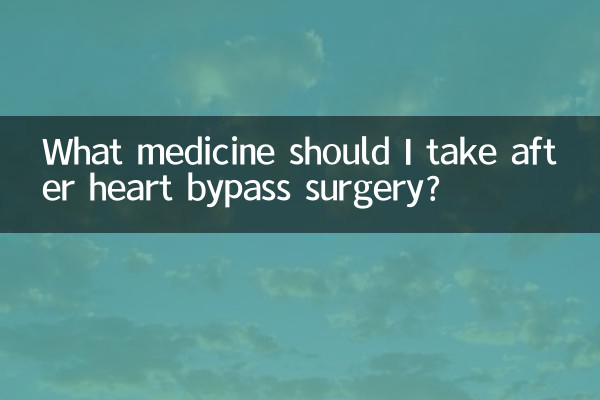What medicine should I take after heart bypass surgery?
Heart bypass surgery (coronary artery bypass grafting) is an important means of treating severe coronary heart disease, but postoperative drug treatment is also critical. A reasonable medication regimen can prevent thrombosis, control blood pressure and blood lipids, improve heart function, and reduce the risk of postoperative complications. The following is a compilation of popular discussions and structured data on medication after cardiac bypass surgery in the past 10 days across the Internet.
1. Postoperative Core Drug List

| drug class | Representative medicine | Mechanism of action | Medication cycle |
|---|---|---|---|
| antiplatelet drugs | aspirin, clopidogrel | Inhibit platelet aggregation and prevent vascular bridge blockage | Long-term (usually lifelong) |
| Statin lipid-lowering drugs | Atorvastatin, rosuvastatin | Lowers LDL cholesterol and stabilizes arterial plaque | long |
| beta blockers | Metoprolol, Bisoprolol | Slow down heart rate and reduce myocardial oxygen consumption | At least 1-3 years |
| ACEI/ARB | Ramipril, Valsartan | Improve ventricular remodeling and protect cardiac function | Long-term (especially with hypertension/diabetes) |
2. Postoperative phased medication strategy
According to the patient’s recovery status, the drug regimen will be dynamically adjusted:
| postoperative period | Focus on medication | Things to note |
|---|---|---|
| Acute phase (0-1 month) | Dual antiplatelet + potent statin + intravenous anticoagulation | Closely monitor bleeding tendency and liver and kidney function |
| Recovery period (1-12 months) | Maintain dual antibodies for at least 1 year and strengthen lipid lowering | Gradually titrate beta blocker dose |
| Long-term management (after 1 year) | Monoclonal anti-platelet + comprehensive risk factor control | Assess drug tolerance annually |
3. Compilation of hot questions and answers
1.Do I need to take Chinese medicine after surgery?
The latest clinical guidelines point out that Western medicine is the basic treatment plan, and some Chinese medicines that promote blood circulation and remove blood stasis may help improve microcirculation, but drug interactions need to be confirmed with the attending doctor.
2.What to do if you forget to take your medicine?
If you miss a dose of anti-platelet drugs, you need to take it immediately; if you miss a dose of anti-hypertensive drugs/lipid-lowering drugs for more than 12 hours, skip this time and do not double the dose.
3.When to adjust medication?
If side effects such as gum bleeding and muscle pain occur, or if liver enzymes are found to be increased more than 3 times during a review, you should seek medical advice in time to adjust the plan.
4. New progress in medication in 2023
| new drugs | Advantages | Applicable people |
|---|---|---|
| Ticagrelor (antiplatelet) | Faster onset of action, reversible inhibition | Patients at high risk of thrombosis |
| PCSK9 inhibitors (lipid lowering) | LDL drops by 50-70% | Those who are intolerant to statins or have poor efficacy |
5. Diet and drug synergy recommendations
• Taking warfarin requires a stable intake of vitamin K (such as green leafy vegetables)
• Avoid taking statins with grapefruit
• Use low-sodium salts with caution during potassium supplementation (e.g., spironolactone)
Note: The specific medication plan needs to be formulated by the cardiologist based on the patient's individual conditions. This article is for reference only. Electrocardiogram, cardiac ultrasound and blood indicators (especially coagulation function and creatine kinase) should be reviewed regularly after surgery.

check the details

check the details